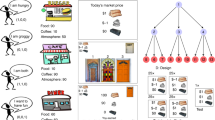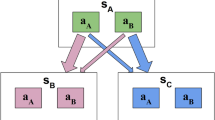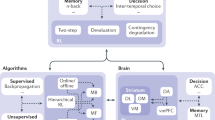Abstract
ALL theories of behaviour have to make predictions about observable responses. Despite the arguments of Kendler1, this should, not be allowed to conceal the fact that different behaviour theories differ radically as to the rules by which they determine membership of a response class. If we are to go on using the term ‘response’ for the units of behaviour among which we seek orderly relationships, it is important that we should be clear what we mean by it.
This is a preview of subscription content, access via your institution
Access options
Subscribe to this journal
Receive 51 print issues and online access
$199.00 per year
only $3.90 per issue
Buy this article
- Purchase on Springer Link
- Instant access to full article PDF
Prices may be subject to local taxes which are calculated during checkout
Similar content being viewed by others
References
Kendler, H. H., Psych. Rev., 59, 269 (1952).
Macfarlane, D. A., Univ. California Pub. Psych., 4, No. 18 (1930).
Lashley, K. S., and McCarthy, D. A., J. Comp. Psych., 6, 423 (1926).
Lashley, K. S., and Ball, J., J. Comp. Psych., 9, 71 (1929).
Deutsch, J. A., The Structural Basis of Behaviour, (Cambridge, 1960).
Deutsch, J. A., Quart. J. Exp. Psych., 11, 155 (1959).
Deutsch, J. A., and Clarkson, J. K., Quart. J. Exp. Psych., 11, 150 (1959).
Author information
Authors and Affiliations
Rights and permissions
About this article
Cite this article
SHELDON, M. Response Learning. Nature 202, 1141–1142 (1964). https://doi.org/10.1038/2021141b0
Issue Date:
DOI: https://doi.org/10.1038/2021141b0
Comments
By submitting a comment you agree to abide by our Terms and Community Guidelines. If you find something abusive or that does not comply with our terms or guidelines please flag it as inappropriate.



